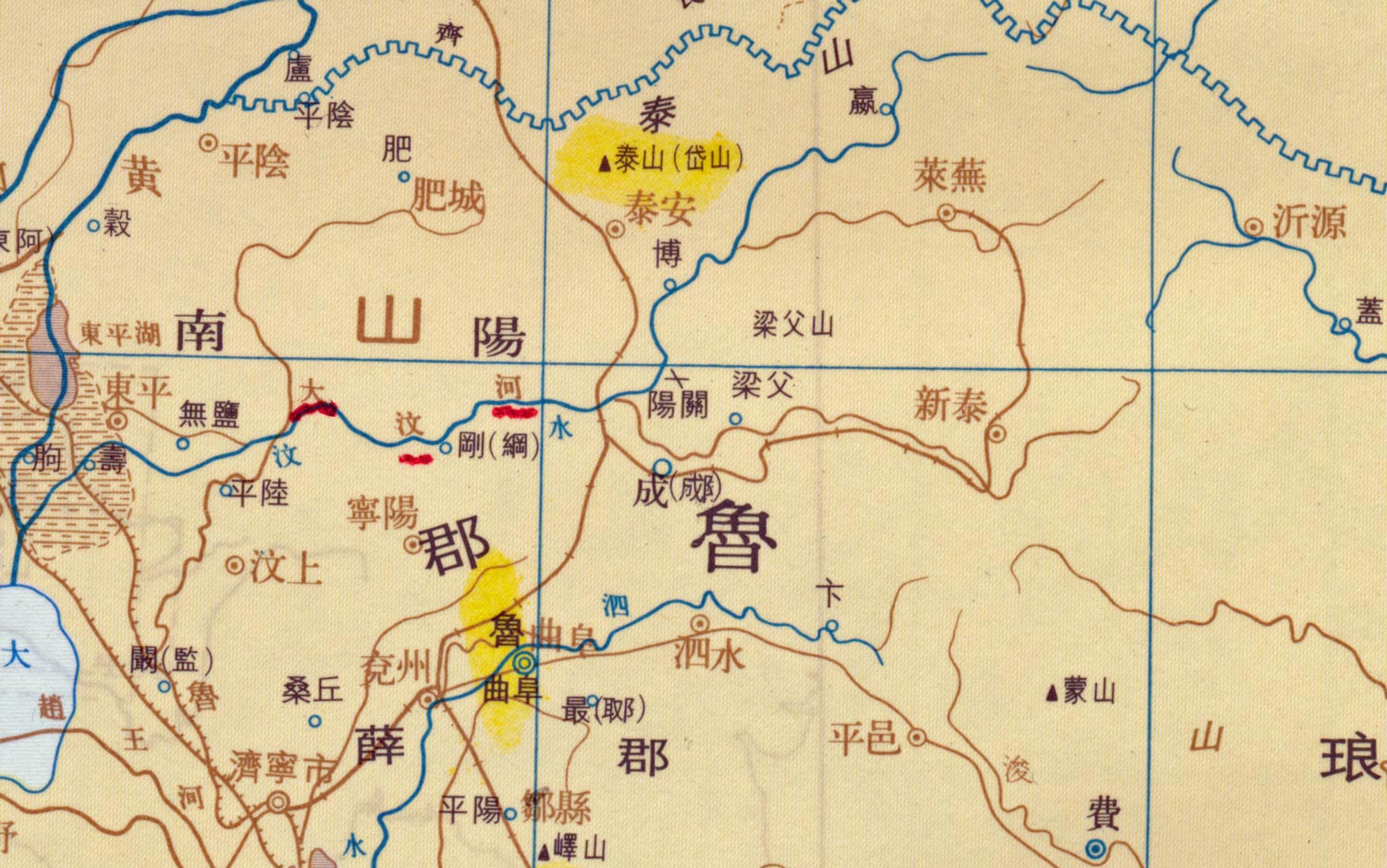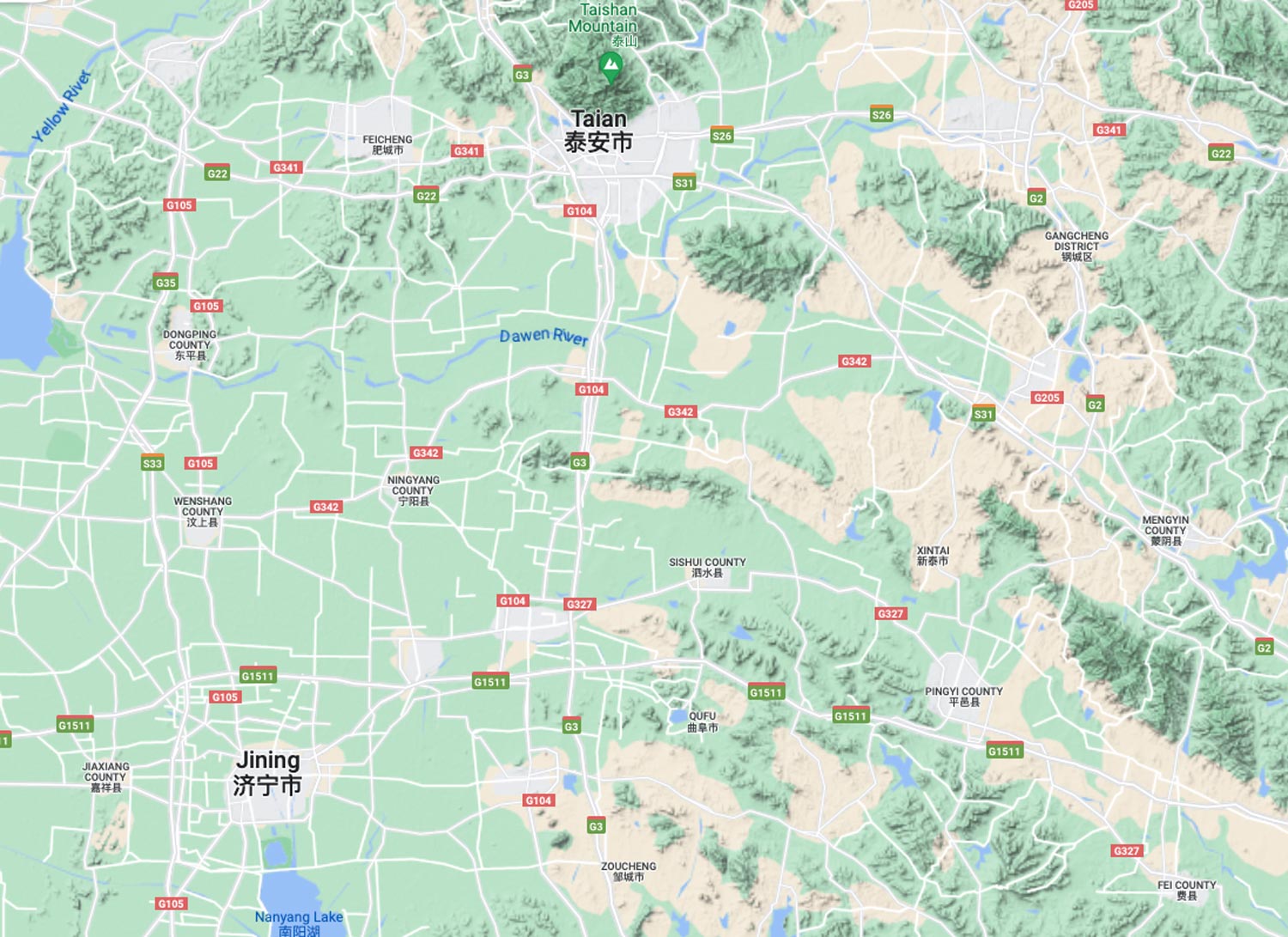|
T of C
Home |
My Work |
Hand- books |
Qin as Object |
Qin in Art |
Poetry / Song |
Hear, Watch |
Play Qin |
Analysis | History |
Ideo- logy |
Miscel- lanea |
More Info |
Personal | email me search me |
| WSQP ToC | 五線譜 transcription 首頁 |
|
02. North of the Wen
- shang mode ( 1 2 4 5 6 1 2 ) 2 |
汶陽1
Wen Yang |
| The Wen River (大汶河) in Confucius' time (expand) 3 |
 This melody, the second of five surviving from Wusheng Qinpu (1453), is generally said to have been created by the handbook's author/compiler, "Lan Xian", the
"Lazy Immortal". However, there is no commentary accompanying the present tablature (the only one with commentary is #3
Xian Shan Yue), and there is evidence that at least some other melodies may have been copied from earlier tablature.4
This melody, the second of five surviving from Wusheng Qinpu (1453), is generally said to have been created by the handbook's author/compiler, "Lan Xian", the
"Lazy Immortal". However, there is no commentary accompanying the present tablature (the only one with commentary is #3
Xian Shan Yue), and there is evidence that at least some other melodies may have been copied from earlier tablature.4
Wen Yang literally means "North of the Wen", a river in Shandong province running east to west, with Mount Tai to the north and Qufu, the hometown of Confucius, to the south. On the south side of the river, within the state of Lu, there was also a place called Bi.5 On the north side, where there is today a Wenyang distict, was the state of Qi.
However, the use of Wenyang as the title here is probably unconnected to any of the physical features of the place of this name. Instead it is used an allusion to making a clever excuse to avoid office and go into reclusion. This allusion comes from the following passage in The Analects (Lun Yu, Book 6, Section 9, original text here).6
Because the Wen River formed the boundary between the states of Lu to the south and Qi to the north, Min Ziqian was saying that he would move to another state so that he could not be called to office by someone he considered as an illegitimate or corrupt ruler.
Original Preface
None (but see the story above).
Music7
(see my transcription; timings follow my recording)
Eight Sections (untitled)
Footnotes (Shorthand references are explained on a
separate page)
1.
汶陽 Wen Yang references
For references see :
- 17530.7 汶上 Wenshang and 17530.9 汶陽 Wenyang.
The story quoted here originates from this passage in the Analects (論語 Lun Yu Chapter 6 雍也 Yong Ye; Ctext, Section 9) :
「季氏使閔子騫為費宰。閔子騫曰:「善為我辭焉。如有復我者,則吾必在汶上矣。」
The 季氏 Ji family were considered usurpers to the legitimate rulers of Lu. Here Min Ziqian is saying that rather than serve them he would flee to the land of 齊 Qi, which was across the river. As for how 汶上 Wenshang becomes 汶陽 Wenyang it is not yet clear to me. 17530.10 is 汶陽端平詩雋 (-juan, jun strange?), a book which includes songs and poems. - 5/992-3 汶陽 Wen Yang and 汶陽田 Wenyang Tian have further references, commenting in particular that "後人常用為隱居典故 later people used (this story) as an allusion to going into reclusion." References include,
應璩 Ying Qu (190-252); wrote hermetic poetry (11599.210, style name 休璉 Xiulian; see also ICTCL, 702-3) 杜甫 Du Fu (712-770)
曾鞏 Zeng Gong (1019-1083); Ouyang Xiu asked him to write an antithesis to Zuiweng Ting (see ICTCL, p.799). Strict Confucian, he became a high official.
翃韓翃 Han Hong (8th c.); see ICTCL, 607/8
Under 汶陽田 Wenyang Tian (Fields of Wenyang?) the story from Lun Yu is again quoted, with an additional comment saying that "後以‘汶陽田’為歸隱的典故。 'Wenyang Tian' was later an allusion to going into reclusion."
Min Ziqian 閔子騫 Min Ziqian was one of Confucius' favorite disciples, original name Min Sun 閔損 (Wiki). There is also an account of him in Qin Shi, where he is called simply
Minzi.
(Return)
2.
Shang mode (商調 shang diao)
Standard tuning is usually considered as 5 6 1 2 3 5 6. There is further information on shang mode under Shenpin Shang Yi and Modality in Early Ming Qin Tablature. However, the mode here seems somewhat different. In particular it does not have the flatted mi that are common in other early Ming dynasty shang mode melodies. A number of phrases end on re (shang), however most sections end on sol (zhi) and the entire piece ends on do (gong).
(Return)
| 3. 大汶河地圖 Map of the Wen River in Confucius time | Modern map with the 大汶河 Dawen River (expand) |
 Copied from The Historical Atlas of China (1991). The atlas has the original names in black and blue, the modern names in brown. The jagged blue line across the top marks the Great Wall of Qi. Just below in the center is 泰山 Mount Tai, highlighted in yellow. Below that underlined in red is the 大汶河 Great Wen River, the river's modern name; just below that (blue letters) is the early name, 汶水 Wenshui. Shaded in yellow below that is the capital of 魯 Lu and 曲阜 Qufu, said to have been the home town of Confucius. Lower right is the city of 費 Bi, from which Min Ziqian retired to north of the Wen. (Note "陽關 Yang Guan near the middle: this of course is not the famous Yangguan."
Copied from The Historical Atlas of China (1991). The atlas has the original names in black and blue, the modern names in brown. The jagged blue line across the top marks the Great Wall of Qi. Just below in the center is 泰山 Mount Tai, highlighted in yellow. Below that underlined in red is the 大汶河 Great Wen River, the river's modern name; just below that (blue letters) is the early name, 汶水 Wenshui. Shaded in yellow below that is the capital of 魯 Lu and 曲阜 Qufu, said to have been the home town of Confucius. Lower right is the city of 費 Bi, from which Min Ziqian retired to north of the Wen. (Note "陽關 Yang Guan near the middle: this of course is not the famous Yangguan."
(Return)
4.
Earliest?
See comments on #1 Chun Yu and
#3 Xian Shan Yue.
(Return)
5.
費 Bi
Modern maps have this city pronounced as "Fei", but
37565 (after having "fei": "wastrel") says that as a 地名 a place name in Lu it should be pronounced "Bi".
(Return)
6. It seems to be Section 9 in some editions of the Analects. (Return)
7
Music
Comments to be added.
(Return)
Return to the Wusheng Qinpu ToC
or to the Guqin ToC.